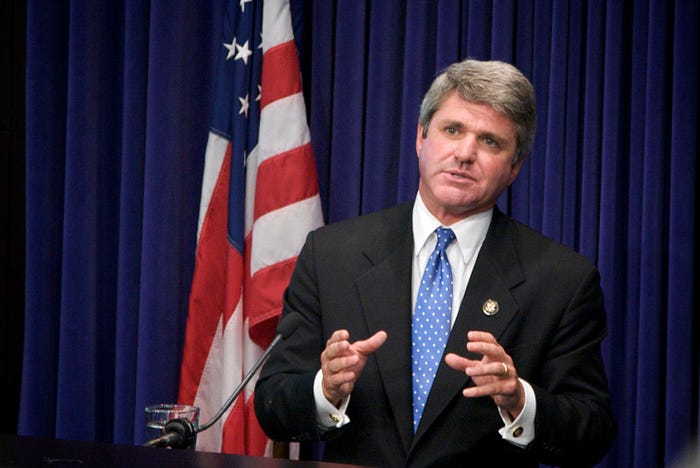In these dangerous geopolitical times, too many mistakes have been made already. Rep. Michael McCaul (R-TX) is determined to right the ship.

Less than a year ago, the prospect of global thermonuclear war seemed a distant dystopian nightmare.
After the devastation wrought by two World Wars, humanity entered into the post-nuclear age and saner heads were supposed to prevail.
M.A.D., short for mutually assured destruction, kept the last Cold War between Russia and the U.S. from escalating into anything worse, though there were tense moments.
Heading into the 21st Century, the leaders of the world’s nuclear powers were supposed to keep the horrors of past wars firmly in mind at all times. Russia in particular should be anxious to avoid another global conflict.
During World War II, the U.S. lost approximately 298,000 people. The U.K. lost 264,443. Occupied France lost 213,324.
The U.S.S.R. lost 18 million. And many historians believe that to be a conservative estimate.
As we all have come to realize in recent months, some of today’s world leaders are neither as familiar with world history nor as committed to self-preservation as we might wish.
With each day that passes since Vladimir Putin’s invasion of Ukraine almost a year ago, the world seems to be inching closer to escalating that conflict into a global conflagration.
In a world that now includes nuclear bombs, bioweapons, chemical weapons, and energy weapons, avoiding another global conflict should be non-negotiable.
Nevertheless, the United States is “on the verge” of escalating its current conflict with Russia, according to Putin’s deputy foreign minister Sergei Ryabkov.
Meanwhile, in the South China Sea, tensions between Taiwan’s government and the Chinese Communist Party are mounting. The People’s Liberation Army is testing the boundaries of Taiwan’s sovereignty.
The CCP is also using the same type of information warfare strategies Vladimir Putin used against Ukraine before launching a full-scale invasion; hacking, infrastructure attacks, economic sabotage, election interference, and propaganda.
Some military and foreign policy experts are warning the U.S. to prepare for a war with China to break out within the next two years. Others are warning that it's not a war the U.S. is equipped to fight.
“The diversion of existing stocks of weapons and munitions to Ukraine and pandemic-related supply-chain issues have exacerbated a sizable backlog in the delivery of weapons already approved for sale to Taiwan, undermining the island’s readiness,” concluded the U.S. — China Economic and Security Review Commission in a recent report to Congress.
“The U.S. defense industrial base is not adequately prepared for the competitive security environment that now exists,” echoed Seth G. Jones in a recent Center for Strategic & International Studies report.
The United States, Jones concluded, “is currently operating at a tempo better suited to a peacetime environment. In a major regional conflict — such as a war with China in the Taiwan Strait — the U.S. use of munitions would likely exceed the current stockpiles of the U.S. Department of Defense (DoD), leading to a problem of ‘empty bins.’”
More than leaving the U.S. and Taiwan unprepared should China attack, stockpiles of weapons are a powerful deterrent. An empty stockpile is not.
With Russia growing closer to China and the U.S. boosting its military presence in Taiwan to counter the powerful new eastern axis, the geopolitical chessboard is looking dire.
It’s easy to see how the U.S. got into this mess. Hindsight being 20/20, U.S. and U.N. officials might have done more to help Ukraine with its corruption problem ten years ago — a real problem systematically exacerbated by Russian propaganda to keep Ukraine out of the NATO protectorate.
How the U.S. steps back from the brink of global conflict is far less clear. Confidence in President Joe Biden’s leadership isn’t at its highest ebb.
Luckily, Mr. Biden’s isn’t the only hand guiding U.S. foreign policy. The House Foreign Affairs committee is under new management.
Texas Congressman Michael McCaul recently became the chairman of this very powerful House Committee and he is exactly the right elected official for the job.
Chairman McCaul, or as TexasMonthly recently dubbed him, “The most powerful Texan in the House,” is the furthest possible thing from asleep at the wheel.
“From Afghanistan to our southern border, the Biden administration has made foreign policy and national security blunders,” Rep. McCaul tweeted on January 13, 2023. “As the first Texan to chair @HouseForeignGOP, I’m working to bring Texas-sized solutions to the problems this admin creates.”
And there are problems aplenty. The U.S. has far bigger problems and is facing more serious threats than it was two years ago.
Supporting Ukraine without provoking Putin into escalation, countering Chinese Communist Party aggression in the South China Sea and beyond; even addressing the fact that the U.S. can no longer manufacture goods critical to national security, like semiconductors, medical supplies, and energy: Rep. Michael McCaul is one person in Washington who understands these growing threats and how to counter them.
With former federal prosecutor and proud Texan Michael McCaul at the helm of U.S. foreign policy in the House of Representatives, the United States may yet safely navigate the treacherous waters ahead.
(contributing writer, Brooke Bell)